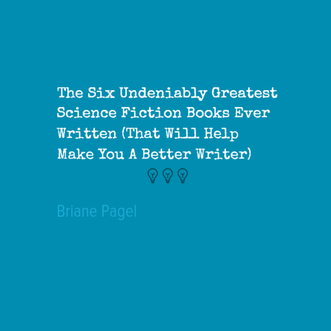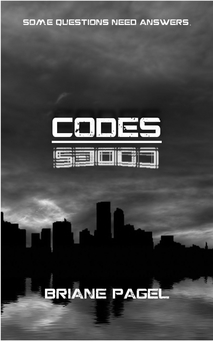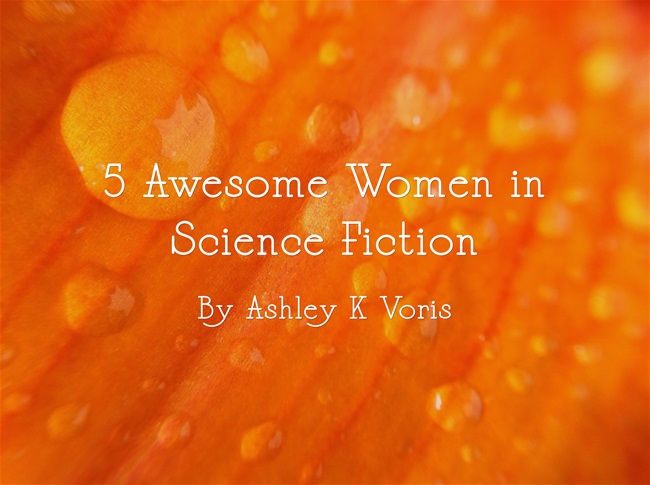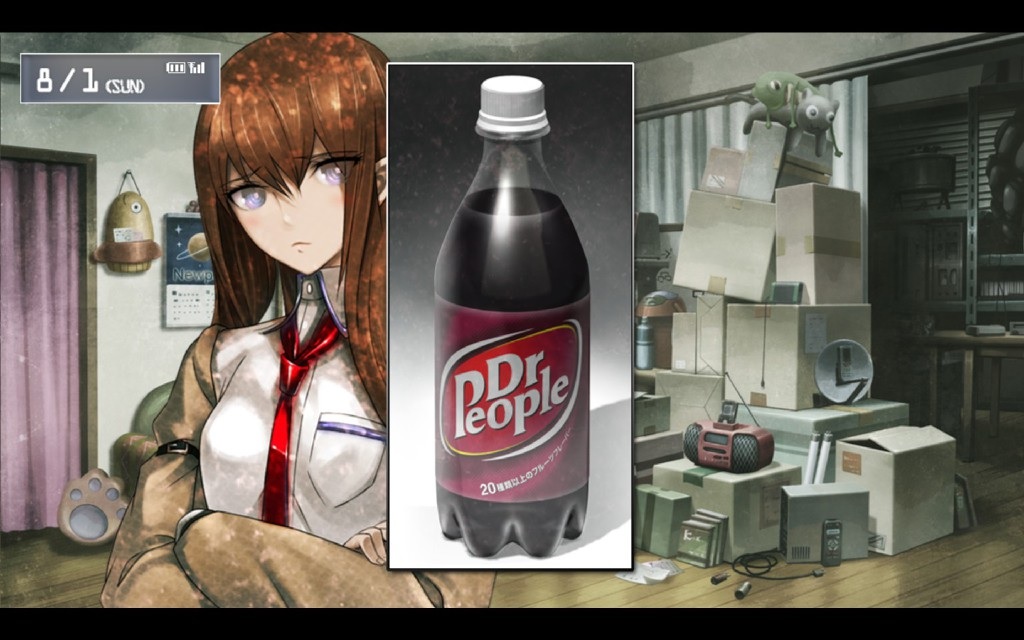I’ve been reading, and writing, science fiction since I was just a kid, starting with comic books and Star Wars novelizations before I was even 10 years old -- materials which spurred me to write my own copyright-infringing space opera, Stardogs, when I was 11. Stardogs told the amazing story of a young, hotshot fighter pilot who manages to get away from his dreary life on a backwater planet to become a pilot for the Space Rebels, and near the end of the story the hero uses his piloting skills to blow up a space station. My mom, my earliest fan/critic, read it and said dryly that she was pretty sure she’d seen that plot somewhere.
I eventually got a little more creative in my writing – Codes hardly steals from George Lucas at all! – but that early attempt at creating my own (?) universe shows the effect great stories have on me: when I’m reading a truly excellent story, half of me is thinking oh man I’ll never write anything this good and the other half is wanting to rush to my laptop to see if I can’t after all come up with a story at least that good. So when I sat down to come up with a list of sci-fi books that are the all-time greatest, a bunch sprung to mind as either inspiring me to want to write something at least that good, while some of the others simply stuck out as great stories. I listed all the greatest books I could find, and then whittled them down and down as far as I could. I wanted to get to five, but in the end, I just couldn’t pick any that I didn’t think deserved to be on a list of the greatest books ever.
Enough with the jibber-jabber! Let’s get to that list, beginning with:
6. John Dies At The End (David Wong):
First off, this book should be an inspiration to every person who ever posted their stories on their blog and hoped for the best. (It’s not just me, right?) Wong began writing this story as a serialization, and then it got picked up by a publisher, and then he wrote a sequel which was nearly as good as this one and almost made this list in its own right, and then the book got made into a motion picture, only because it didn’t feature soft-core bondage nobody really paid any attention to it. Also, the movie was terrible. Don’t see it. Read the book, though: the story of two guys fighting weird animals coming through from another dimension into their town is hilarious, sad, dramatic, weird, and overall a rambling fun time that gets really really freaky at the end of the story.
How it made me a better writer:
Reading John Dies and it’s sequel This Book Is Full Of Spiders Seriously Dude Don’t Touch It helped me remember that stories ought to be fun, and that science fiction can literally go anywhere and do anything and you can bend the rules in all sorts of ways and still have a great story.
5. Startide Rising (David Brin):
David Brin is one of my all-time favorite sci-fi writers. Without making a big deal of it the way some writers do (Larry Niven *ahem*) Brin manages to write the kind of science fiction I think of as “hard” sci-fi, based on what seems to be fairly realistic science, but he keeps it relatable and doesn’t overwhelm you with math and engineering and the like. Startide Rising is the first in his “Uplift” saga about humanity venturing into the wider universe after having helped make dolphins and chimpanzees sentient starfaring races in their own right, and it manages to be a massive space opera spanning an entire system (if not a galaxy) while also feeling intimate and close-up. What’s most amazing about the story is that Brin’s dolphins and chimps and aliens aren’t just humans with fins: they manage to have unique personalities that fit together with the species they are. That’s actually rare in sci-fi. Too many times, nonhuman species are more or less just regular people in a costume, acting the way a human thinks an alien would act.
How It Made Me A Better Writer:
Brin’s science is a good example of “show, don’t tell.” The science-y talk in Brin’s stories fits in well with the plot and doesn’t drag or slow it down. Whereas some writers (Niven, again) will spend pages explaining something they find interesting, Brin works it into the story in a fairly organic way. It makes reading his books less like reading a technical manual and more like reading a novel. It’s going to be necessary, in speculative fiction, to explain some things, but if you can do it without resorting to putting a teacher in a room with a chalkboard, so much the better.
4. The Sparrow (Mary Doria Russell):
This was recommended to me by author Andrew Leon (The House On The Corner, Shadow Spinner), and I’m glad I took his advice. The Sparrow tells the story of humanity’s first contact with aliens, on another planet – but the mission is undertaken by the Jesuits on behalf of the church, rather than by a government or corporation. I was initially concerned that the story would be preachy – aliens and God are a tough mix – but The Sparrow managed to be philosophical and weighty without ever becoming didactic or ponderous, and was one of those rare books that had me anxious to keep on reading it. I’d actually regret it when I got too tired to read it at night.
How it Made Me A Better Writer:
I’ve always thought writing should have a point – not necessarily a moral, but something to say, a reason for telling the story. The Sparrow was perhaps the first book in which I thought the point, the thing the author was trying to say, was just: think. I’m sure Russell had some idea of her own themes, but the overarching idea I got was that she just wanted people to ponder the ideas she’s wrestling with. Sometimes, writing about things you don’t yet understand is more compelling.
3. Stranger In A Strange Land (Robert Heinlein):
Valentine Michael Smith might be the single most memorable character ever created, and this weird, wonderful book, which I first read when I was about 19, has haunted me for nearly 30 years. Haunted in a good way. Smith’s human-raised-by-Martians-come-back-to-Earth character manages to upset the entire world, one person at a time, enraging people and making them fall in love with him as he tries to understand our society. The ending of the book is somehow both peaceful and disturbing in ways that make it stick with you. It’s the kind of book that just pops into your mind at odd times of the day or night.
How it Made Me A Better Writer:
Stranger is more or less the Platonic ideal of how to build a complete story out of an elevator-pitch concept. The thesis statement for this book is that simple: Imagine a human raised by Martians, come back to our society as an adult: what would happen? Everything in the book, from the simplest to the most outrageous moments, seems to flow organically from that idea. There isn’t a single moment in the book that doesn’t seem a natural next progression. It’s a work of art.
2. Slaughterhouse-Five (Kurt Vonnegut):
I don’t have to say what this one’s about, right? Everyone’s read it, or hopefully will. Billy Pilgrim’s travels through time, to World War II and then to Ilium, New York, and then Tralfamadore, are a funny, sad, sweet story that has weight well beyond the slim novel. I read Slaughterhouse when I was in high school, and I’ve never forgotten it. I remember it almost verbatim, even though I’ve never gone back to re-read it. I’m not even sure I could, as it’s devastatingly sad in its simplicity. Plus, it has the single saddest scene I have ever read in a book: the part where Billy goes to a cave with his parents, when he’s a kid. I know there are sadder things that have happened, both real and imagined, and there are even more terrible things that happen to Billy, but that’s the scene that gets me, every time I think of it.
How It Made Me A Better Writer:
Vonnegut’s stories are so sparse as to be almost nonexistent; he uses a paucity of words and just enough “science” to make his books sci-fi rather than fiction, but somehow the books add up to more than the sum of their parts, primarily because of the emotion Vonnegut conveys. Using minimalist techniques, Vonnegut communicates a wealth of sadness, in that good kind of way: sadness because people are what they are, and the world is what it is, even in a made-up futuristic society of aliens. Reading Vonnegut helps me realize that books should convey a sentiment as well as a story: they can tell how you as the author feel about something, without being direct about it.
1. Angelmaker (Nick Harkway):
I had trouble deciding which of Harkaway’s three books to put on here, but there was no doubt that one of them should be. Harkaway might be the best pure writer I have ever read, by which I mean that every single word he uses counts. I have no idea how he does it, but Harkaway writes these big sprawling books that go off on seeming tangents for pages, if not chapters, and introduce a willy-nilly of characters and ideas and then bam! They all come together like a jigsaw puzzle made of magnets. Angelmaker features a watch/clock repairman who is called in to work on a bit of steampunk-ish beehive-esque art, and who then unwittingly turns the thing on, learning too late that it might be a doomsday device. That description in no way does this book justice, though. Harkaway’s stories are outrageously entertaining, his characters are memorable, his language is phenomenal, and the books deserve to be read, then cast in bronze and put on a pedestal, and then read again, in front of large crowds of people cheering him on and urging him to write another book. Read Angelmaker, and then read his other books (The Gone Away World and Tigerman) and see if they don’t ruin you for most other books.
How It Made Me A Better Writer:
Forget it. It didn’t. There’s no way anyone can do what Harkaway does. We can try, and plenty of people can write great stories or books, but nobody will match him.
| Briane is the author of Codes: Robbie had an ordinary life, until she walked into Gravity Sling. Now he’s seeing coded messages everywhere, being chased by shadowy big-corporation goons, and questioning literally everything about the world as he knows it. Some questions need answers. This Phillip K. Dick style debut science fiction novel raises questions about how people use technology and each other. Links: Follow Briane on Twitter: https://twitter.com/BrianePagel His blog: Thinking The Lions: http://www.thinkingthelions.com |
Anyway, are you excited about the contest? I'm excited about the contest. Also, I might be mildly panicking about AwsomeCon still. As one does.
Update about the Contest of Awesome (which I shall call it from now evermore) I'll be posting the first scavenger hunt clue/trivia question Monday morning! Then, I'll post it again about noon because I know sometimes feeds are strange, strange creatures. As soon as we have a correct answer I'll tweet, but I won't announce the day's winner until the end of the day. That way I can check and make sure the first correct answer I see is actually the first correct answer.
Now I just have to go decide what Monday's prize is...






 RSS Feed
RSS Feed
